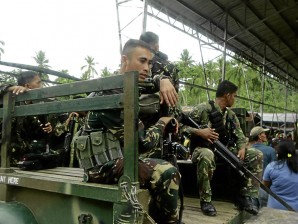Appeal to Army: Leave civilians alone
DAVAO CITY—For Emily (not her real name), the jungle was the safest place to spend the night in with her two children—a year-old baby and a 10-year-old son—weeks after the grenade explosion that wounded more than 40 people in Paquibato District here.
The jungle became her temporary refuge after soldiers harassed her 10-year-old son, asking the boy where his father was amid talk in Emily’s neighborhood that the man had joined the communist New People’s Army (NPA).
“This left the boy shaken. He did not go to school for days,” Emily said.
Earlier, another woman, Rudith Montejas, her arms and legs covered by bandages from the September grenade explosion in the village, said she was thankful that she was the one who got hit in the explosion and not her 2-year-old child.
Montejas said she had handed the child over to her husband only minutes before the blast.
Article continues after this advertisement“I wouldn’t have known what to do if the child got hit,” she told the Inquirer.
Article continues after this advertisementEmily and Montejas, 28, are only two of the scores of civilians who are increasingly getting caught in the middle of the raging war between government forces and the NPA in Paquibato.
Even as the wounds suffered by Montejas and her neighbors started to heal, people in areas near where the explosion took place continue to worry that the same fate, or worse, would befall them as fighting escalates between soldiers and rebels.
Bishop Modesto Villasanta, a leader of the interfaith group Exodus for Justice and Peace (EJP), said communities, where Army detachments are right smack in the middle of civilian communities, are increasingly getting “uneasy” and fearful that they will get caught in the crossfire.
Bishop Villasanta said soldiers encamped in barangay halls, schools, daycare centers and other civilian structures is true not only in Davao City but also in other hinterland areas in Compostela Valley, Davao Oriental and Agusan del Sur.
He said that under Republic Act No. 7610, or the law providing deterrents and special protection measures against child abuse, exploitation and discrimination, soldiers are not supposed to use schools and daycare centers as camps because these are “zones for peace.”
But Lt. Col. Inocencio Pasaporte, head of the 69th Infantry Battalion assigned to the area, said the soldiers are there to “immerse” themselves in civilian life in the villages, which is part of the Army’s peace and development outreach program.
“Soldiers in these areas are not committing any abuses,” Pasaporte said. “Instead, they are helping farmers,” he said.
But the fact-finding mission led by EJP in Barangay Pandaitan in Paquibato led to a different conclusion.
Bishop Villasanta said people complained that when soldiers arrive to set up detachments, they also start conducting a “census,” asking people about their political affiliations and about the whereabouts of their family members.
